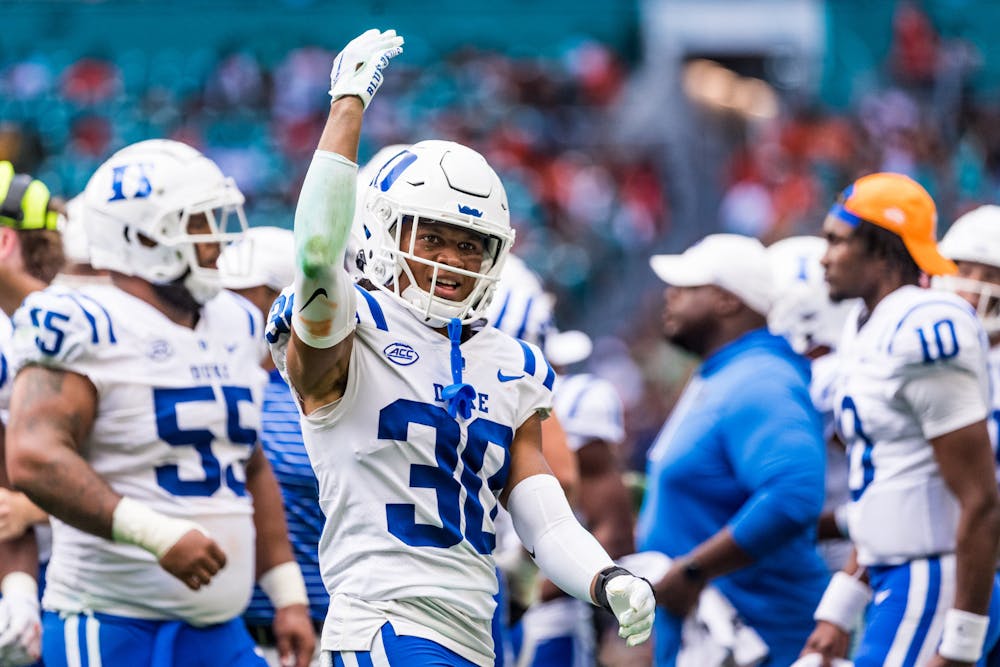Play for the name on the front, some say. That paradigm of team sports prevails, but it does not preclude players from putting their own flair into their on-field look. Players and numbers become synonymous; Michael Jordan and his No. 23 on the hardwood or Tom Brady’s No. 12 on the gridiron evolved into symbols of leadership and winning.
But a number is, after all, just a number, though it perhaps comes with some underlying personal meaning, supplementary swagger or the respect of newcomers. That’s certainly true for a bounty of the Blue Devils’ returning starters.
For a few of Duke’s returners, jersey-number swaps carry some deeper significance. For others, they just like the way it looks.
Jaquez Moore, Ja’Mion Franklin, Brandon Johnson and Sahmir Hagans each swapped jerseys to join the single-digit club this offseason — and here’s why:
Moore and Johnson agree that the player wearing the jersey makes the number, but neither feel as though their number has any bearing on their performance. Moore acknowledges, however, that a few of his teammates at Suwanee High School in Live Oak, Fla., felt that not getting “their number” meant a bad season was in the cards.
So what about Moore’s number?
Even when handed No. 20 as a freshman in 2021, the junior running back just “went with the flow,” Moore told The Chronicle. Maybe being assigned the bulky No. 87 as a sixth-grader gave him practice in the world of get-what-you-get-and-don’t-get-upset.
He had even already tried switching to his new number, nine, but a positive COVID-19 test during the number-change window a season ago meant he was stuck with two-zero on his back another year. Five-hundred-eighty-nine total yards and five touchdowns later, he gets that No. 9, which he says is a tribute to his two uncles. Neither of them were able to wear it in college due to Moore’s grandmother’s poor health.
“I’m gonna [wear No. 9] to represent them and live their dreams through me,” Moore said.
For Johnson, last season’s burgeoning star in the defensive backfield and preseason All-ACC honoree, his threads bearing No. 3 intertwine with a prominent part of his life — his twin brother Tyler.
“We are three minutes apart, I was born in the month of March, the third month of the year, and also born in 2003,” Johnson said.
Threes abound. The third-year nickelback swapped from his prior assignment of No. 30 back to his first, favorite and only uniform number all the way through high school.
In case you were wondering, the Newton, N.C., native’s next interception will be the third of his career.
On the other hand, Hagans and Franklin uphold the mantra of “look good, feel good, play good,” when talking about their uniform numbers.
“It’s a feeling thing,” Hagans said.
The wideout formerly wore No. 85, with the five on his chest seemingly wrapping around to meet the eight on his back. This year, the receiver will wear No. 2, which ought to create some fun matchups between him and teammate Jaylen Stinson — who also wears the number — in practice.
Like Johnson, Hagans wore his new number (new to Duke fans, at least) in high school in Philadelphia. He says it is a “lucky number,” but if his 31 catches for 400 yards and six total scores including a memorable fourth-quarter end-zone grab against North Carolina were without his lucky number, who is to say what he can do while wearing it.
But even if his new number was not available, the redshirt sophomore was looking to change his number around anyway.
“It just happened that my lucky number was available,” Hagans said.
Franklin brings a more casual attitude toward jersey numbers: “I believe that whatever number that I have, I’ll go out there and perform wearing it.”
Get The Chronicle straight to your inbox
Sign up for our weekly newsletter. Cancel at any time.
He admits that some of his teammates are superstitious about numbers, like Hagans, but some just “don’t want a number that looks bad.”
The former Notre Dame transfer wore No. 55 in South Bend, Ind., and in his first season in Durham because his father, James, wore it as a basketball player. But this year, the physical defensive tackle and graduate student wanted to “go out with a bang.”
“Five is a single digit. D-linemen who wear single digits are pretty special. I think I’m a special guy. And also it makes me look slimmer. So I decided to lose a five and look slimmer,” he said.
Franklin illustrates how you have to earn a single-digit number. As a matter of fact, Duke rewarded its defensive line with single digits for one game in 2020.
“You don’t really put bums out there in single digits,” Franklin said.
Seniority, leadership and on-field performance combine to give players the privilege of picking up a jersey with numbers zero through nine.
“It comes with being an older guy that you get to pick your number,” Johnson said.
“I think that I earned it through my performance,” Moore remarked.
“[Head coach Mike Elko] rewards good performance and good qualities and good leadership with priority in new numbers,” Hagans explained.
But that adds just an extra bit of pressure to perform: People notice the players wearing single digits and expect them to make the big plays, according to Franklin and Hagans.
If they don’t, well, it might be time for a new number.
Editor's note: This piece is one of many in The Chronicle's 2023 Duke football preseason supplement. For the rest, click here.
Micah Hurewitz is a Trinity senior and was previously a sports managing editor of The Chronicle's 118th volume.

